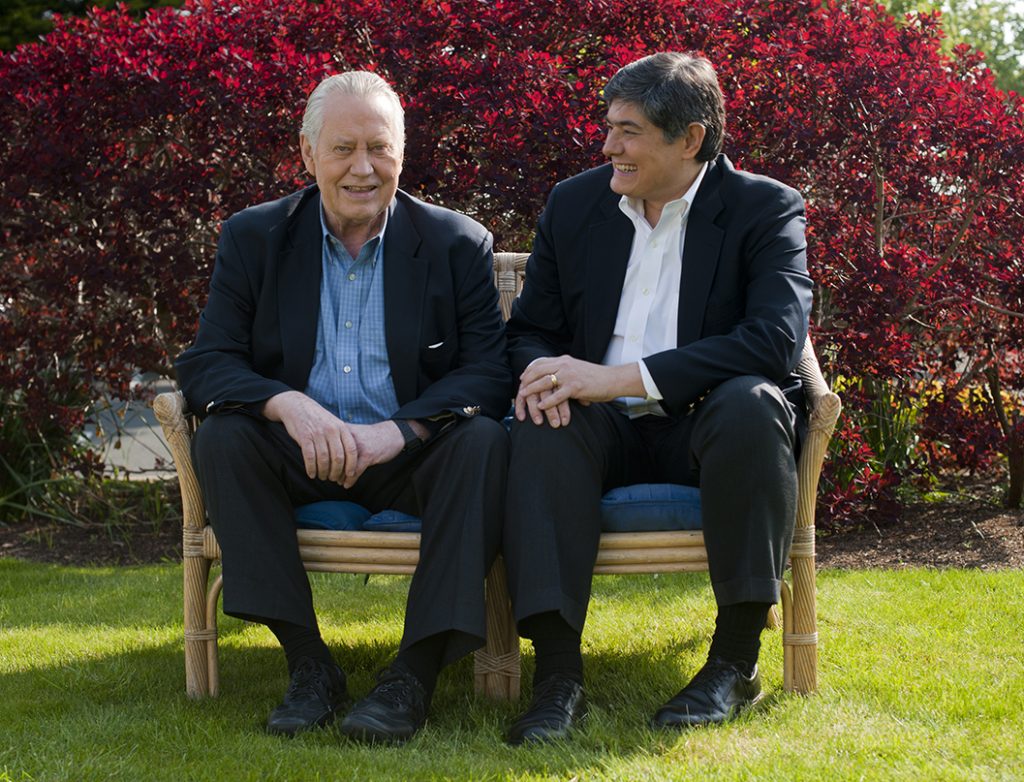The Atlantic Philanthropies Makes New Grants to Cornell
Resource type: News
Cornell University | [ View Original Source (opens in new window) ]

By Jose Beduya
The Atlantic Philanthropies, created by Charles F. Feeney ’56, made its very first grant in 1982 to Cornell University. By the end of this year, the foundation will conclude its grant-making, realizing the full impact of the foundation’s largesse within its founder’s lifetime and fulfilling Feeney’s commitment to “Giving While Living.”
Among Atlantic’s end-stage grants are three new investments in Cornell: $10 million for the Center for the Study of Inequality, based in the College of Arts and Sciences; $3.25 million for Cornell Law School’s International Center on Capital Punishment; and $3 million toward the creation of a university welcome center. The grants are the latest in an extraordinary history of support for Cornell, totaling nearly $1 billion, spanning the university’s campuses, and touching virtually every aspect of the university’s teaching, scholarship and research, and campus life.
“Cornell is fortunate to have had The Atlantic Philanthropies as an ally for more than three decades,” said Hunter R. Rawlings III, Cornell’s interim president. “Atlantic’s new awards advance initiatives that are tremendously important to Cornell, our faculty and our students. We are especially grateful to the foundation for partnering with us to further efforts that will combat inequality and promote human rights on a global scale.”
The $10 million grant to the Center for the Study of Inequality (CSI) is one of the largest ever for the social sciences at Cornell. Funding from Atlantic in the late 1990s helped to create CSI as the university’s hub for the interdisciplinary study of inequality. The new grant will endow the center’s directorship, expand its staff, and stimulate research, outreach and policy impact through faculty fellowships, a seed grant program, conferences and a visiting speaker series.
“The College of Arts and Sciences looks forward to working with The Atlantic Philanthropies – and with other institutions in its network of partners – to address inequality in all its forms,” said Gretchen Ritter ’83, the Harold Tanner Dean of the College of Arts and Sciences. “Under Kim Weeden’s leadership of the Center for the Study of Inequality, we are poised to become a world-class research leader, as well as a major resource for developing more effective policy solutions to one of the most significant threats to democracy and social inclusion in our lifetime.”
At Cornell Law School, Atlantic’s support will establish the Cornell International Center on Capital Punishment, with a combined thrust in advocacy and research and a goal of building partnerships with national and international organizations. In addition to supporting the center’s leadership, the gift will enable a summer training program for capital defense lawyers from Africa, the Middle East and Asia, where death-row populations are greatest. It will also advance research for the Latino Defendants Project and help to sustain Death Penalty Worldwide, a free online database on different laws and practices in countries and territories where capital punishment is still in place.
“Atlantic’s gift will allow the Law School to launch the first international center on capital punishment in the United States, building on the unique strength of Cornell Law School’s faculty in the fields of capital punishment and human rights,” said Eduardo Peñalver ’94, the Allan R. Tessler Dean of Cornell Law School. “Capital punishment has emerged as one of the most important human rights issues in the 21st century, and I am immensely pleased that Atlantic has recognized our faculty’s leading role in this debate.”
Atlantic’s $3 million to support a Cornell welcome center is provided as a challenge grant to help raise an additional $3 million in philanthropy to complete the project. The welcome center will be housed in a repurposed and renovated Noyes Lodge – a central and iconic site overlooking Beebe Lake – and will feature a spacious reception, information and waiting area. One of the center’s largest rooms will be dedicated to an exhibit that shares and celebrates Cornell’s history, mission and values.
“Chuck Feeney – along with many of his classmates in the Class of ’56 who are celebrating their 60th Cornell Reunion this year – has long recognized the need for a university welcome center. We are grateful to him and to Atlantic for helping realize this vision,” said Rawlings.
He added: “Every year, tens of thousands of visitors come to campus. Thanks to this challenge grant and the additional support it will inspire, we can create a fitting place to give our guests a warm welcome, provide them with the information they need, and introduce them to the people, places and ideas that give Cornell its special character.”
Rawlings announced the three grants at the June 10 Olin Lecture, a highlight of Reunion that this year featured a conversation between Christopher G. Oechsli, president and CEO of The Atlantic Philanthropies, and Frank H.T. Rhodes, president emeritus of Cornell and former board chair of Atlantic.
Jose Beduya is a writer for Alumni Affairs and Development.